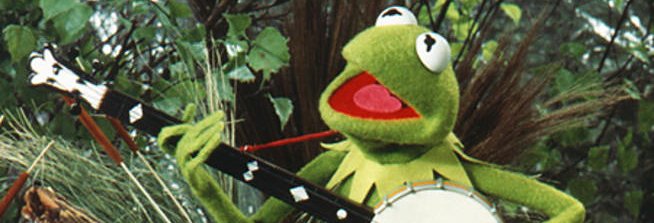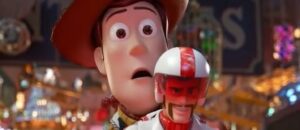Over on his Whatever blog, author John Scalzi poses an interesting philosophical question about the nature of an important scene in ‘The Muppet Movie’. I thought I’d put it to our readers to decide the correct answer.
In his famous song “The Rainbow Connection,” Kermit the Frog sings the following verse:
Why are there so many songs about rainbows
and what’s on the other side?
Note the line break in the lyrics and accompanying pause in Kermit’s singing. Scalzi interprets this to mean that Kermit is asking two separate questions:
- Why are there so many songs about rainbows?
- In a related topic, what’s on the other side of rainbows?
On the other hand, many listeners believe that Kermit is asking just one question: Why are there so many songs about what’s on the other side of rainbows?
Do you see the critical distinction?
For my money, I have always believed that Kermit is asking just one question in regard to songs about what’s on the other side of rainbows. In support of this, I have to ask just how many songs there are about rainbows anyway? Excepting this one itself, the only other song about rainbows that I can think of is “Somewhere over the Rainbow” from ‘The Wizard of Oz’, which is indeed about what’s on the other side of rainbows.
What other famous songs about rainbows am I missing? Is Kermit being ironic when he asks “Why are there so many?” when there’s really just the one?
How do you read his lyrics?






William Henley
I think the fact that there is an “and” in it suggests one question. You do not start a sentance with a conjunction.
As for other songs:
http://youtu.be/KtxfNnx98ng
Brady Bunch – Gonna Find a Rainbow (its on the Brady Bunch album – you can find it on Amazon)
Also
http://www.lyricsmode.com/lyrics/c/colbie_caillat/rainbow.html
Barsoom Bob
The occurrence of a Rainbow is a kind of special, magical thing, although not nearly as rare as you might think, depending on where you live and how aware you are of your natural surroundings. It is also shaped like a bridge between two points.
I think the mythology is just rooted in basic escapism, this special bridge has to lead to something more rewarding, pot of gold, or a special magical place, like OZ. Hence, it is not just the rainbow itself but where it might lead to that fascinates.
Not to be too cynical, but knowing what we do now know about certain Muppeteers, the rainbow coalition flag is an identifier for gay friendly spaces and may be why there is this Muppet/rainbow connection. This is said somewhat in jest, but who knows.
EM
William’s analysis is bogus, for one can indeed conjoin questions: e.g., “Who are you, and how did you get in here?” (“I’m a locksmith, and I’m a locksmith”. —Police Squad!) Nevertheless, I agree that the intention is almost certainly to ask the single question. If there are two questions, the second one feels like a non sequitur (e.g., it may not be the other side of rainbows that it’s asking about; maybe it’s asking about death, for instance).
William Henley
http://grammar.yourdictionary.com/parts-of-speech/conjunctions/conjunction-exercises.html
Types of Conjunctions
Coordinating conjunctions join words or ideas together, but not full phrases or sentence. For example, if you stated that you like chicken AND fish, and acts as a coordinating conjunction. It joins the two nouns in question: chicken and fish.There are six coordinating conjunctions in English:
•For
•And
•Nor
•But
•Or
•Yet
These six coordinating conjunctions can be remembered by using the acronym FANBOY.
As the conjunction AND is used, then, gramatically, these cannot be two questions – they can be two similar ideas, but NOT two seperate questions.
Josh Zyber
Authorhttp://grammarist.com/grammar/conjunctions/
A conjunction connects two or more sentences, clauses, or parts of clauses.
http://grammar.ccc.commnet.edu/grammar/conjunctions.htm
When a coordinating conjunction connects two independent clauses, it is often (but not always) accompanied by a comma:
Ulysses wants to play for UConn, but he has had trouble meeting the academic requirements.
http://grammar.ccc.commnet.edu/grammar/indep_clauses.htm
Independent clauses can be connected (or separated, depending on your point of view) in a variety of ways. When two ideas come together and either one of them can stand by itself — as its own, independent sentence — the following kinds of punctuation are possible.
Comma + a cute little conjunction (and, but, for, nor, yet, or, so)
My grandmother refuses to go to bed early, and I’m afraid she’s going to catch a bad cold.
And furthermore:
http://grammarist.com/grammar/conjunctions-to-start-sentences/
If anyone tells you starting sentence with a coordinating conjunction (and, but, for, nor, or, so, yet) is incorrect, hand them any piece of professional writing and have them take a look. In literature, journalism, speeches, and formal writing of all kinds, using these conjunctions to start sentences is more than just acceptable; it’s ubiquitous. Open any book, even one with technical, scholarly, or otherwise formal writing, and you are likely to find numerous examples. There are exceptions, of course, but these are rare. That there is some sort of rule against sentence-beginning conjunctions is an old myth that never seems to go away despite the fact that it is not at all borne out in the writing of actual English speakers.
William Henley
Yes, but from your grammer.ccc link:
When a coordinating conjunction is used to connect all the elements in a series, a comma is not used:
Presbyterians and Methodists and Baptists are the prevalent Protestant congregations in Oklahoma.
As there is no comma sued, it is connecting elements in a series, not a seperate thought. Therefore, by the links you provided, it is still one question, not two.
Josh Zyber
AuthorAh, but this is a song lyric, where there line break functions as punctuation.
William Henley
Ah, but a line break does not necessarially mean punctuation – it can, but not necessarially:
Worthy is the Lamb who was slain
Holy, holy is He
Sing a new song to Him who sits on
Heaven’s mercy seat
Holy, holy, holy is the Lord God Almighty
Who was and is and is to come
With all creation I sing praise to the King of kings
You are my everything and I will adore You
In this case, a line break represents punctuation everywhere EXCEPT betweein “sits on Heaven’s Mercy seat”. In fact, in this instance, while the word ON is drawn out in the song, there really is not an audible break between “on” and “heaven”.
There are other examples, that is just one that came to mind. So while a line break can mean punctuation, it should never be assumed as such.
William Henley
Also:
http://www.gpuss.co.uk/english_usage/start_sentence_conjunction.htm
So now we’re all grown up, we’ll ask again – why? The honest answer is that there is no reason. It’s just an arbitrary rule that’s been passed through the ages. But all language is arbitrary, isn’t it? Words and letters are but abstract concepts, the understanding of which can only come through the education of rules.
As usual with these issues, the argument is between the way English is used and the way it is “supposed to be”. Sometimes a full stop is required to drive home a sentence or give a meaningful pause. And an afterthought like this one gets more impact when it’s a sentence rather than a conjoined clause. So when someone tells you not to start a sentence with a conjunction, say: “But I’ve already done it.”
What is a conjunction?
A conjunction is a word that joins two clauses, phrases or words together. By this rigid definition, it’s not hard to see why some people think they can’t be used to start a sentence.
The answer is that just because something is used in common, everyday use does not make it correct.
Josh Zyber
Author“The answer is that just because something is used in common, everyday use does not make it correct.”
Language is fluid. The rules of English grammar we have today are not the same as were used 500 years ago, or even 100 years ago. Once the usage becomes common enough, it will become a rule and “correct.” Starting sentences with a conjunction is already common enough and has been in use long enough that any rule against it is outmoded. The same applies to splitting infinitives, which most linguists today agree is acceptable.
“So while a line break can mean punctuation, it should never be assumed as such.”
That’s the whole point of this poll, isn’t it? How do you interpret the lyric? 🙂
William Henley
Once the usage becomes common enough, it will become a rule and “correct.”
So txt lng is ceptbl?
Seems exceptbl 2 me. Cause evry1.does.it.
🙂
BTW, I <3 this thread! Stupid thing to get all crazy about! Doncha think! Gotta <3 grammer nazies!
EM
Abbreviation has a long history. Its socially accepted use is often dependent on context. Hint: the Bonus View allows messages far exceeding 140 characters.
Daniel Joseph Sardella
http://www.youtube.com/watch?v=ByZU28u81Qw
And why doesn’t somebody just ask Paul Williams?
EM
You mean, Why are there so many songs about the reason no one asks Paul Williams?
AllanL5
Well, really, now there are TWO songs about rainbows — Judy Garland’s, and “The Rainbow Connection”. And “The Rainbow Connection” is kind of two songs all by itself, since Kermit sings it in the beginning, and the entire cast sings a redux version at the end.
Oh, and “World on a String, Sitting on a Rainbow…” also by Harold Arlen. Might ask why Harold Arlen likes rainbows so much, but it would be hard to rhyme.